
How to Nullify a Decree
One cannot nullify a decree without first nullifying the cause (the bad Jewish conduct). Esther's first act was to call Jews to repentance and fasting.

The holiday of Purim celebrates the miraculous deliverance of the Jewish people from a threat of annihilation: the evil plan fomented by Haman and signed by King Achashverosh, to “annihilate, kill and destroy all the Jews” (Esther 3:13), Heaven forbid.
Both Mordechai, the leader of the Jewish people at that time, and his relative, Queen Esther, played a central role in nullifying the dastardly decree. The manner in which they did so is most instructive.
At that time, Mordechai was part of Achashverosh’s court, serving as a close advisor to the king. Moreover, he had recently saved the king’s life. Esther was, of course, Achashverosh’s wife, a woman the king found  “gracious and charming.” Given that the two were so well connected, it might seem that the first thing to be done to save the Jews would be to use these connections to try and annul the decree.
“gracious and charming.” Given that the two were so well connected, it might seem that the first thing to be done to save the Jews would be to use these connections to try and annul the decree.
Yet, as soon as the decree became known, Mordechai “garbed himself in sackcloth and ashes and went out to the midst of the city [of Shushan],” calling on all Jews to repent. Only after doing so did he instruct Esther to “go to the king, to supplicate him and beseech him regarding her people.”
Esther conducted herself in a similar fashion. Before seeking an audience with the king, she conveyed the following message to Mordechai: “Go and assemble all the Jews… fast on my behalf. Do not eat or drink for three days.” Moreover, she said: “I too… shall fast in like manner” (ibid, 4:17).
Now, Esther desperately needed to be found appealing to the king, especially so since her visit would be unauthorized, and thus fraught with personal danger. She had not been called into the king’s presence for 30 days. So why did she decide to fast for three days – an act that would cause her to appear much less physically appealing?
The answer is that both Mordechai and Esther realized that the decree regarding the Jews was the result of improper Jewish behavior. Since it is abundantly clear that one cannot nullify an end result (the decree) without first nullifying the cause (the erroneous Jewish conduct), their first act was to call Jews to repentance and fasting.
Once the spiritual cause of the decree had been ameliorated through repentance, and because G-d desires that one act through natural means, the two only then went to Achashverosh in an attempt to abolish the decree.
Because the appeal to Achashverosh was thus merely the natural vessel for the true salvation which came from above, it is understandable that Mordechai and Esther were not overly concerned by physical appearance or human diplomatic skill.
The lesson is obvious: There are those who think that during times of distress, G-d forbid, natural remedies should be the first course of action.
The story of Purim teaches us that natural means are only a secondary step; the first step must be to strengthen our bond with G-d by studying His Torah and performing His mitzvot. Then, and only then, should we turn to natural means to extricate ourselves from our difficulties.
When we act in this manner, we can be secure in the knowledge that whatever natural garment we employ will act to convey the supernatural miracle which is ultimately responsible for getting us out of trouble.
Just as this is so regarding Israel as a whole, so too is it in regard to individual Jews. Every Jew must know that he is bound up with G-d, who totally transcends nature. While G-d’s blessing must be clothed in the natural vessel of human action (“all that you do”), human activity is, after all, no more than a garment. The main emphasis must not be on the garment, but on stimulating G-d’s abundant blessings through the study of Torah and the performance of mitzvot.
* * *
Excerpts from “Sichos in English”, reprinted with the kind permission of www.sichosinenglish.org











Tell us what you think!
Thank you for your comment!
It will be published after approval by the Editor.